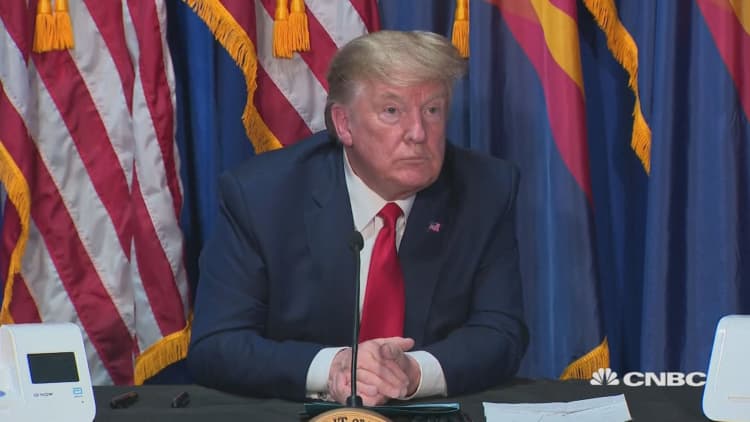WASHINGTON -- President Donald Trump on Tuesday acknowledged that reopening parts of the nation's economy now, against the advice of many health experts, would inevitably cost some Americans their lives. But he argued that the benefits outweighed the costs.
"It's possible there will be some [deaths] because you won't be locked into an apartment or house or whatever it is," Trump told ABC's David Muir in a rare network news interview. "But at the same time, we're going to practice social distancing, we're going to be washing hands, we're going to be doing a lot of the things that we've learned to do over the last period of time."
As of Tuesday, U.S. deaths had climbed above 70,000, with total cases at 1.2 million.
"There'll be more death, that the virus will pass, with or without a vaccine. And I think we're doing very well on the vaccines but, with or without a vaccine, it's going to pass, and we're going to be back to normal," Trump said.

There is no evidence so far that, in the absence of a vaccine, the virus "will pass" in a way that allows the country to return to a pre-coronavirus "normal." In fact, it's the opposite. Trump's own top scientists say they believe the virus will come back in the fall and may even prove to come back every season like the flu.
But the president argued that not reopening businesses also costs people their lives, in the form of drug overdoses and suicides.
"People are dying the other way, too." said Trump. "When you look at what's happened with drugs, it goes up. When you look at suicides, I mean, take a look at what's going on. People are losing their jobs. We have to bring it back and that's what we're doing."
There is currently no documented epidemic of suicide, although experts say it's likely that a mental health crisis is looming.
Trump made the remarks Tuesday during a visit to a Honeywell factory in Arizona, which is producing N95 respirator masks. It was the president's first trip outside of the Washington area since the pandemic took hold nearly two months ago.
"The people of our country are warriors," Trump said during a roundtable earlier in the day. "I'm not saying anything is perfect. Yes, will some people be affected? Yes. Will some people be affected badly? Yes. But we have to get our country opened and we have to get it open soon."
Trump also said his own expectations for the mortality rate were rising. "I always felt 60, 65, 70, as horrible as that is. I mean, you're talking about filling up Yankee Stadium with death! So I thought it was horrible. But it's probably going to be somewhat higher than that," he said to Muir.
Trump's acknowledgement that reopening the country would likely cost lives represents a shifting White House calculus about risk and reward, given the economic hardship that the closure of most businesses in most states has caused over the past month.
Since mid-March, more than 30 million Americans have filed claims for unemployment. Meanwhile, the $1,200 temporary relief checks that Congress approved for more than 100 million Americans were not designed to provide long-term solutions, just a short-term bridge until the country reopened.
Now, after a month during which the country has been in virtual lockdown, new coronavirus cases appear to have leveled off in some areas, but they haven't plummeted the same way they have in countries like New Zealand.
"While mitigation didn't fail, I think it's fair to say that it didn't work as well as we expected," former FDA Commissioner Scott Gottlieb said in a televised interview last Sunday. "We expected that we would start seeing more significant declines in new cases and deaths around the nation at this point, and we're just not seeing that."
"We may be facing the prospect that 20,000, 30,000 new cases a day diagnosed becomes a new normal and a thousand or more deaths becomes a new normal as well," Gottlieb said. He also noted that the numbers of new cases are still rising in more than a dozen states, even as other states begin reopening.
--- CNBC's Dawn Kopecki contributed reporting


